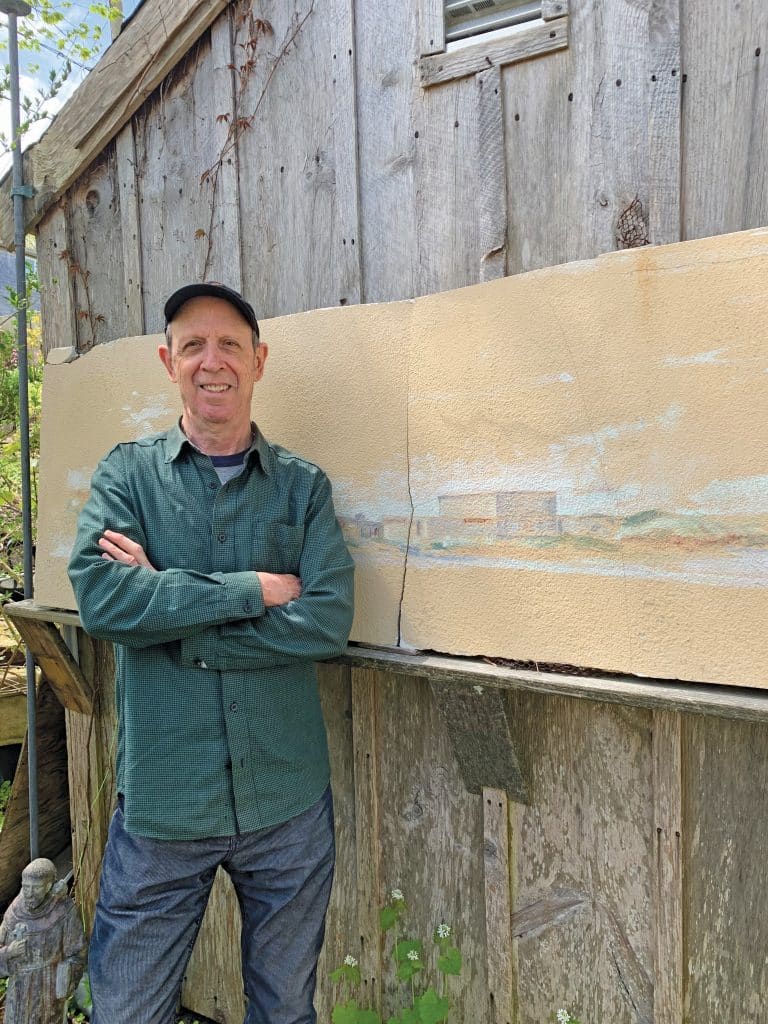Jay Critchley in front a mural done by artist Jim Broussard from the “Ten Days That Shook the World: The Centennial Decade” multi-media exhibition at the old Herring Cove Beach bathhouse in 2012.
Photo: Steve Desroches
by Steve Desroches
The National Park Service recently announced $1.25 million in grants to projects meant to document the histories of underrepresented communities, including $50,000 to the Provincetown Community Compact to assess the LGBTQ history within the Provincetown National Register Historic District. The money funds a two-year project that the Compact will oversee as a group of historians, writers, and community members work to research and develop which LGBTQ stories should be included in the federal government’s historic district in town. This is a first of its kind opportunity for Provincetown, whose LGBTQ history is of national significance, but has largely been ignored.
“It’s starting a process,” says Jay Critchley, artist, founder, and president of the Compact, a nonprofit community-building and philanthropic organization. “I don’t think Provincetown has been given its due in American history, particularly its LGBT history.”
The project this grant funds builds on the work done by the late Josephine Del Deo, a titan of Provincetown’s historical and environmental legacy as she was at the forefront of Provincetown participating in the Cape Cod National Seashore as well as the creation of Peaked Hill Bars Historic District in 2012 that includes the dune shacks and the National Register Historic District in question, which was created in 1989. This district is not to be confused with the town’s historic district, created in 2002, which oversees historic preservation for structures within its boundaries. The National Register Historic District includes 300 acres of town, 1200 structures and additional sites within its boundaries roughly drawn between Route 6 to the north and Provincetown Harbor to the south, with the west end and the southeastern end of Commercial Street providing its other boundaries. Created by the National Historic Preservation Act in 1966 the National Register of Historic Places is administered by the National Park Service. The register maintains a list of “districts, sites, buildings, structures, and objects deemed worthy of preservation for their historical significance or ‘great artistic value’.”
“The National Register is the official list of our Nation’s historic places that are worthy of preservation,” says NPS Director Chuck Sams. “The National Park Service is proud to work with our Tribal, State, and local partners through the Underrepresented Communities grant program to ensure that the National Register better reflects the important places and significant stories of all Americans.”
Inclusion does not guarantee preservation, but is rather meant to support private property owners, preservation organizations, and local and state governments in preservation efforts as well as contribute to the national historical record. And so the original creation of Provincetown’s federal historic district included 200 years of history and topics including tourism, fishing, the art colony, as well as designating four buildings for specific historical status on the national register (the Unitarian Universalist Meeting House, the current Provincetown Public Library, the Freeman Building, formerly the library, and the United States Post Office), but nothing about the town’s storied and deep LGBTQ history.
“For a long time Provincetown has been an escape valve for artists, pirates, mooncussers, queers, and outsiders to reflect on and escape the American experience,” says Critchley. “It has a long history that often doesn’t get the attention it deserves. The artistic history doesn’t get quite the attention it deserves and definitely the queer history of the town is overlooked. The theatrical history is getting attention, but that’s really been in the past twenty years or so. This grant is helping play catch up with our history and place Provincetown in its rightful spot in American history.”
This grant is one out of 21 projects in 19 states and the District of Columbia, and one of four that focuses on LGBTQ history with the others being a statewide survey of LGBTQ historical sites in Colorado and Washington States’ Puget Sound as well as an amendment of New York City’s Chelsea Hotel’s inclusion on the national registry to include its LGBTQ history. The remaining grants all pertain to Native American or African American history as well as migrant workers and women in trade and construction industry. The Underrepresented Communities program began in 2014 and has since provided $7 million to state and tribal historic preservation organizations and local governments seeking to diversify their contributions to the National Register of Historic Places.
Right now the Compact is working with the National Park Service to develop the scope, scale, and parameters of the project. And to alleviate any confusion, while the Park Service administers the grants, this project does not include the Cape Cod National Seashore, just the district aforementioned. It is determined that the project will date back as far as the earliest documented moment in LGBTQ history up until 1996, to ensure Provincetown’s experiences during the HIV/AIDS pandemic is included. And attention will be paid to those marginalized within the LGBTQ umbrella to ensure inclusion. Once the specific mission is agreed upon the Compact will assemble advisors, scholars, and historians as well as seek community input over the two year process. Critchley notes that Provincetown’s LGBTQ history is too large in scope to be completely addressed in two years and that often these grants are the first of several, but are administered in steps for work to be assessed and for gaps to be identified.
“The enormity of the subject matter requires time and patience,” says Critchley. “What’s necessary is to establish context and the Provincetown story. It’s just the beginning.”











